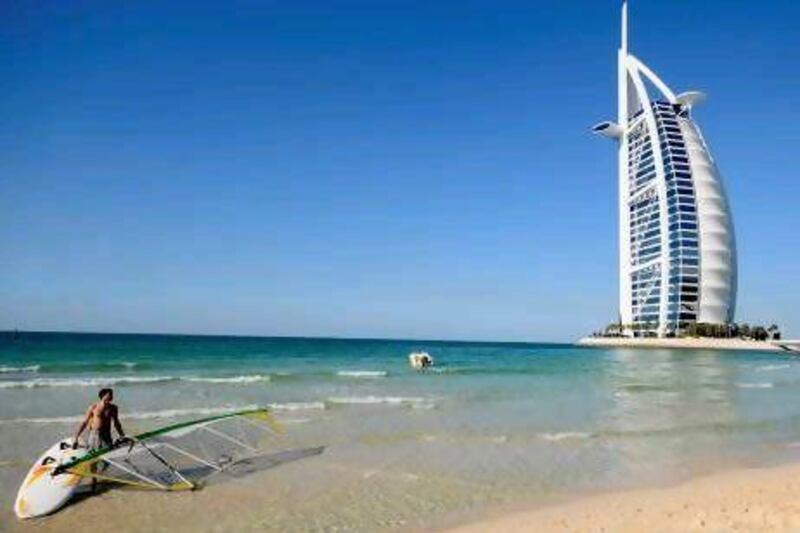DUBAI // Rafia Al Ameemi is a rare sight in a UAE hotel. One of just a handful of Emiratis in the country interacting with tourists, she is at the front desk of one of the country's most famous landmarks, the Burj Al Arab.
She knows her decision to go into hospitality is unusual, and even unpopular, but says the job makes her proud as an ambassador of her country.
Ms Al Ameemi has just graduated from the Emirates Academy of Hospitality Management where she gained her postgraduate certificate in hospitality operations, and earned an associate degree.
She interned at Al Qasr hotel in Dubai during her final year at Zayed University while studying human resource management, and that was all it took.
"My first experience was front office and I loved that," she said.
She is among a slowly increasing number of Emiratis choosing hospitality and tourism, fields which until now have struggled to attract nationals, due to often low pay, low prestige and occasionally antisocial hours.
Ms Al Ameemi, 23, is the only Emirati among her 200 colleagues. "For most of them, this is the first time they have worked with an Emirati," she said. "There is a misconception that the people in these jobs are not educated. I wanted to break that image. I didn't want a routine job, and I love the interaction of working with so many nationalities and in the front office. "
She said that not only does her job offer tourists a chance to interact with a local, but it puts local guests and other Arabian Gulf nationals at ease to see a familiar face. "Guests from the GCC feel more comfortable when they see me," she said. "A lot of female guests, or those from the GCC, ask to deal with me."
Ms Al Ameemi works the same shifts as her team, often finishing in the early hours. "I will not ask my team to do anything I am not willing to do," she said. "I want to dispel the myth that we can't work. We work hard."
The college has been using Ms Al Ameemi as a role model, taking her to schools in an effort to make students aware of the industry.
"At the schools, I tell them how I worked even in housekeeping," she said. "I have worked in every department, so I really understand how the whole hotel works and exactly what every person does."
The potential to progress in the industry remains a strong motivating factor.
Since Emirates Academy opened in 2001, 19 Emiratis have graduated with degrees in hospitality management. This year, there are 13 Emirati students registered in the undergraduate programme, and 20 more in the master's programme.
About 10 or 12 scholarships are offered to Emirati students each year. All citizens get a 50 per cent discount on tuition.
The college is owned by the Jumeirah group whose hotels include Zabeel Saray on the Palm and the Al Qasr. Emiratis on scholarships are guaranteed jobs for two years following graduation.
Ahmed Al Kaitoob, head of Jumeirah's National Development Programme, said the company was setting a precedent with its outreach efforts. "Locals bring culture, and the UAE culture is key to the hospitality industry," he said.
By the end of the year, the group hopes to increase its percentage of Emiratis in management from 10 to 12 across all areas of the business.
Dr Khalid Al Khaja, dean of humanities at Ajman University, said, while many Emiratis take up tourism-related government jobs, such as working for the Department of Tourism, they are still a rare sight for visitors in hotels.
"These jobs in hotels just don't pay well," he said, which is a deterrent to many. He said more attractive options for Emiratis include museums and cultural institutions.
In Abu Dhabi, the Tourism Authority has over the past year been attending career fairs to reach out to Emirati school pupils and students to show them opportunities in the sector.
The federal Higher Colleges of Technology in Al Gharbia hoped to launch a diploma in tourism in the past two years but found little take-up in a sector challenged with cultural resistance.
Four Emirati women work at Desert Islands Resort and Spa on Sir Bani Yas Island, which opened in 2008. Other Emiratis play key protocol roles at Qasr Al Sarab hotel in Liwa, acting as a bridge between the hotel and local authorities as well as advising on the cultural suitability of the hotel's new projects.
[ mswan@thenational.ae ]






